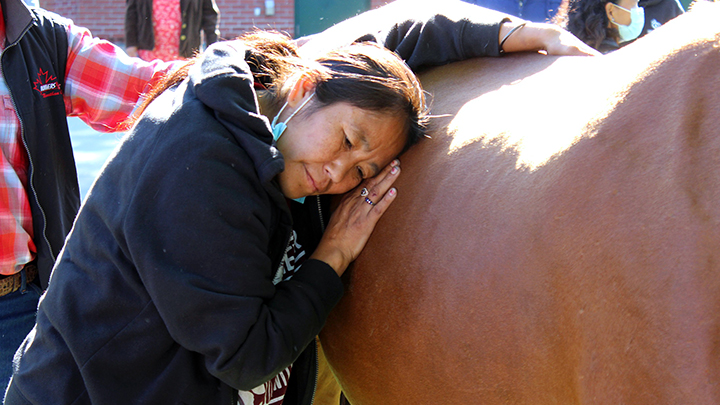
November 1, 2021

Estella Rose Crazy Weasel makes an equine connection during a visit by AHS staff at a pop-up event in Galt Gardens. Therapy horses were provided by the Lethbridge Therapeutic Riding Association.
Story by Kelly Morris | Photo by Patrick Burles
Many of us have a horse story, especially in southern Alberta. Now, members of vulnerable populations in downtown Lethbridge have a few new tales of their own to tell, and more familiarity with how Alberta Health Services is there to care for them.
“People’s relationships with horses are deep and wide and profound, and all so varied, but they tend to have an impact no matter what,” says Jason Shriner, executive director of Lethbridge Therapeutic Riding Association (LTRA).
It’s for this reason that therapy horses were recently brought to Galt Gardens in downtown Lethbridge to connect Alberta Health Services (AHS) and community partners with vulnerable populations that gather in the area.
The equine visits stem from a partnership between AHS and LTRA, supported by a Mental Health and Addiction COVID-19 Community Funding Grant.
During two visits in September, the horses brought together more than 20 individuals to build connections with members of AHS’ Harm Reduction and Intervention team, the Indigenous Wellness Core, Addiction and Mental Health Recreation Therapy and the LRTA .
“A lot of our clients are needing ways to connect and build rapport,” says Paul Weiss, manager of Adult Outreach and Day Treatment with Addiction and Mental Health at AHS. “There’s a lot of stigma, and maybe past traumatic experiences when it comes to accessing supports.
“By going out and meeting clients where they’re at, it helps build that trust so we can eventually talk to them about different options for recovery and provide a non-judgmental approach.”
Research shows that being with a horse can not only regulate heart rate and blood pressure, but has an overall calming effect. LTRA horses are trained therapy horses — taught to remain calm, patient and kind — no matter their surroundings.
“Horses are natural empaths,” says Shriner. “They’re like sponges for our feelings and the vibes that we’re giving off. They take on what we have, but they also give out what they have.”
Roxie Vaile, Indigenous hospital liaison, attended with AHS’s Indigenous Wellness Core and saw firsthand how the horses calmed those in attendance.
“Sometimes the people that are on the streets can be tough on the outside, but I found that toughness just kind of broke away,” adds Vaile. “Our people have a long connection with horses. Some of these people haven’t been out to the reserve in quite some time, where horses are all over the place, so it was nice to see them reconnect. It gives us a good way of connecting with them, finding out what’s going on in their lives. It takes everybody’s guard down and opens up the communication.”
Purcella Old Shoes attended the first pop-up event in the Gardens. Spending time with two horses helped her to open up to talk about equine and other forms of therapy.
“(These horses) are very special because they help with therapy for people in need. Knowing they help people with fears and everything is so awesome,” says Old Shoes. “I had a good morning, and wish the very best for them to continue doing what they do — helping.”
And with the help of equine team members, AHS staff and community partners have been able to build bridges, create rapport and deliver joy.
“There’s a natural empathic compassion to a horse,” says Shriner. “They love attention. They love to be touched, to be groomed. They’re community-based animals. All of these characteristics come out in the human-equine relationship — all those things we crave — connection, affection, love and touch. If we’re lacking those, this opportunity provides it in a completely non-judgmental fashion.”
As a way to connect with the vulnerable population, however, pop-up events strive to be primarily about the horses, and not a direct promotion of services.
“A lot of the time I think services are refused because it’s Alberta Health Services, or not wanting support at that time,” says recreation therapist, Brandy Tonin. “This way we can start the conversation as we’re talking about the horses, then we can bridge the gap to offer service and support.”
Four additional pop-up events are planned, with a goal to continue the growth of the program.
“Sometimes we can be quite suspicious of outsiders and I think the horses created a really relaxed environment,” says Vaile. “I think if it were done on a regular basis, it would help to find out what the needs really are. I think we really need to do more intervention and prevention, so I think there’s a good opportunity to make this happen a lot more.”
The partnerships between AHS and the LTRA are expected to grow and expand. “We want to contribute to wellness in this community,” adds Shriner. “There’s a lot of pain out there and I think that equine therapy has a role to play in helping ease it. It’s a happy medicine.”